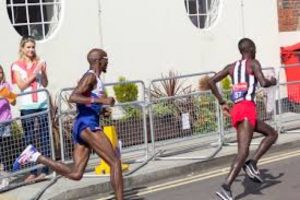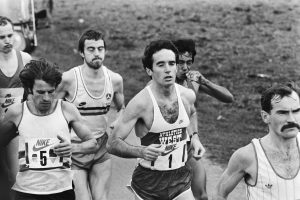This week’s BBC Panorama documentary dissecting doping allegations against Mo Farah and his coach Alberto Salazar deservedly sparked widespread criticism.
New information released showed Farah, Britain’s greatest ever track athlete, used L-Carnitine with unforthcoming help from members of the United Kingdom Athletics Association, days before the 2014 London Marathon.
The main revelation of the documentary came when it was revealed the extent UKA helped Farah, with little knowledge from the various anti-doping agencies.
Farah’s repeated denial that he hadn’t taken the performance enhancing drug before changing his statement to say he had were similarly revealed, as he cited a lapse of memory as the reasoning behind his earlier denial.

Although not technically proven to have cheated, morally what he did was completely wrong and with Salazar’s proven history of doping, presumptions can undoubtedly be made.
Either Farah lied as he knew it was morally wrong, or more worryingly, Salazar was feeding him so many supplements, a needle into his arm days before competition wasn’t an irregularity.
Regardless, the ongoing drama damages the sport amongst the masses; a issue far greater than Farah’s individual reputation.
Eight years ago, and with the 2012 Olympics pending, Lord Sebastian Coe made clear the measurement of success for the Games would be increased participation levels, with the slogan for London 2012 being to ‘Inspire a Generation’.
A ‘Super Saturday’ with gold medals for Mo Farah, Jessica Ennis and Greg Rutherford certainly motivated thousands being the greatest night in British athletics history, but now, how much those accomplishments can be celebrated is in question.

As those in the early 1990’s celebrated a later guilty Linford Christie, it is difficult to see why the same won’t happen to Farah; perhaps leaving the lasting legacy of London as detrimental.
Unfortunately, Farah on his own won’t be called into scrutiny, the sport in a public sense will be labelled negatively and any accomplishment will be automatically called into question.
Perhaps rightfully so however. In my opinion, the situation outlines that the ever-present British virtue signalling is nonsensical.
The idea that a doping issue is resolute to other countries is just false.
However, the public in the UK always seem to pass blame and pretend those issues are at fault of those who are Russian or from the United States.
However put, doubt and willingness to win will always override morality.
As George Orwell said in 1945, “Serious sport has nothing to do with fair play. It is bound up with hatred, jealousy, boastfulness, disregard of all rules and sadistic pleasure in witnessing violence; in other words it is war minus the shooting.”
The difference between first and second is astronomical. Nobody would have held Farah in as high of a regard if his gold medals were changed for silver and bronze. For many, deceiving the sport can usually work, but when it doesn’t, the effects on legacy are rightfully significant; as Farah may find out.
Perhaps the worst thing about the situation was the aid from UK athletics officials.
As those mocked the Russian doping campaign, similar wrongdoings have seemingly been happening in this country. Although different supplement-wise, the act of secretly helping those with dubious methods is the same in principle.
Especially UKA head of endurance running, Barry Fudge, travelling to Zurich to buy the L-Carnitine from a contact of Salazar’s and UKA chief medical officer Dr Rob Chakraverty not recording his dosage, saying he had been too busy to do so.
Farah also failed to record he had taken the drug in his weekly supplement log book a week after the event.
The whole circumstance still remains a mystery and the answers to what happened before the event will never truly become clear.
However, nobody can blame the majority of the public for drawing assumptions.

As with anything though, improvement and a reignition of a reputation can be done and the Tokyo Olympics later this year offers the chance for redemption; not from UKA specifically though.
Jess Ennis-Hill’s former coach Toni Minichiello has called on new UK Athletics Chief Executive, Joanna Adams, to ensure the high-performance system becomes more transparent.
“The board have ushered in a new era and culture of transparency and accountability,” he said. “This is a great opportunity for UKA to put those words into practice, regain the trust of the sport and live up to its own values of communication, respect, integrity, quality, accountability.”
Maybe the damage has already been done, but if not, the burden lies on those competing now to amend the mess.
Luckily for UKA, Katarina Johnson-Thompson and a flood of young talent are beginning to find global success in the athletics realm.
KJT was amongst few nominated for the BBC Sport’s Personality of the Year award in 2019 and with her personality accompanying her talent, she is the figurehead for 2020 success.
Moreover, with the most global attention likely to centre on the sprinting realm, 24-year-old Dina Asher-Smith could also be the main figure to reignite change.
Her first taste of Olympic success came four years ago when she won a bronze medal in the 4x100m relay team. The bronze now sits amongst a Commonwealth gold, three European golds, three World Championship silver medals and a gold last year in Doha in the 200m; the first female in British history to climb the top of any individual sprinting event.

Since her youth days in the sport, the UK athletics scene has targeted her for greatness. Amazingly, Asher-Smith has reached the final of every event in every major championship she has ever attended, both in the Junior and Senior category.
As she lines up against the top talent of Jamaica and USA in foreign territory, the hope of her individual success isn’t solely riding on her performance.
She isn’t the only competitor that the future looks bright for though.
Zharnel Hughes became the second fastest Briton of all time in June 2018, with a recorded time of 9.91s in the 100m and worldwide success is imminent on his current career trajectory.
Fellow British sprinter Reece Prescod joined Hughes on the podium at the Berlin European Championships, as the pair picked up gold and silver medals concurrently.
Britain have experienced recent success at the younger age categories with the 2018 Under 20 World Championships in Finland being testament to that.
Jona Efoloko and Charles Dobson claimed the 1st and 2nd position in the 200m, with Kristal Awuah taking the bronze in the 100m.
Britain topped the Under 18 European Championships overall medal tally with 22 in total and eleven golds; proving the future is bright.
Perhaps the new era of athletes will bail out UK Athletics’ reputation as Mo Farah and alike have let it down.

Perhaps those in charge of the country’s athletics should come clean and own their mistakes, but likely, it will once again by on the shoulders of those competing to amend the butchery.
Picture by Al King under Creative Commons License

















